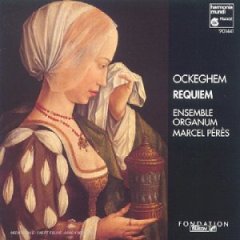Johannes Ockeghem - Requiem (Peres) [1993]
Johannes Ockeghem - Requiem (Peres) [1993]

[01] Introit. Requiem eternam dona eis Domine 4'35
[02] Kyrie (Solistes: Josep Benet, Stephan van Dyck) 4'31
[03] Epistola 3'30
[04] Graduale. Si ambulem in medio umbre mortis 7'34
(Solistes: Josef Benet, Josep Cabré)
[05] Tractus. Sicut servus desiderat ad fontes aquarum 6'34
Stephan van Dyek, Josep Benet (versets I,III,IV)
Josep Cabré (versets II,III,IV), Malcolm Bothwell (verset II)
[06] Evangelium 4'20
[07] Offertorium 8'29
[08] Praefatio 3'00
[09] Sanctus (ANTONIUS DIVITIS) 3'11
[10] Agnus Dei (plain-chant) 1'18
[11] Communio. Lux eterna luceat eis (ANTONIUS DIVITIS) 2'05
[12] Repons. Libera me, Domine, de morte eterna(plain-chant) 5'39
Ensemble Organum
Marcel Pérès - conductor
Johannes Ockeghem's Requiem is a beautiful example of the plainchant mass and is the earliest surviving polyphonic Mass for the Dead. It was most likely written in 1461 and originally consisted of the Introit, Kyrie eleison, Graduale, Tractus, and the Offertorium. All the other texts were probably sung in unembellished plainchant, following normal church practice. In this pre-Tridentine setting, the Requiem appears truncated, but to call this performance a reconstruction or a completion is not quite accurate since Ockeghem's work was as complete as he deemed necessary. However, to give this recording a semblance of completeness for modern listeners, Ockeghem's movements are presented here within the liturgical context, with the Epistle, Gospel, Agnus Dei, and Libera Me sung by Marcel Pérès and Ensemble Organum in plainchant. The Sanctus and Communio, though, are provided as supplements to flesh out the work; attributed to Antonius Divitis, they follow Ockeghem's style using the same ornamented chant lines and fauxbourdons in the lower voices. Ensemble Organum's male voices blend well, are flexible, and make the contrapuntal lines quite transparent. In the Sanctus, they are joined by three members of Les Pages de la Chapelle, whose voices add a bright luster to the otherwise somber coloration of this work. --- Blair Sanderson, Rovi
download: uploaded yandex 4shared mediafire solidfiles mega zalivalka cloud.mail.ru filecloudio anonfiles oboom
